Analyzing the Historical Impact of Colonialism in Canada
VerifiedAdded on 2023/01/19
|5
|1241
|57
Essay
AI Summary
This essay provides a comprehensive overview of colonialism in Canada, exploring its historical context and multifaceted impacts on indigenous communities. The essay defines colonialism as a system of control and unequal power distribution, focusing on its connection to the history of food and the displacement of indigenous peoples. It examines the sociological imagination and perspectives, including alcoholism, drug consumption, and societal breakdowns. The essay delves into functional, communication, critical, and feminist perspectives to analyze the effects of colonialism. It discusses economic marginalization, resource extraction, land claims, and the resulting poverty and social issues. The essay references key studies and arguments, highlighting the lasting consequences of colonialism on Canadian society, including the disruption of traditions and the prevalence of social and health issues. It also examines the evolution of colonial policies and their impact on the indigenous population.
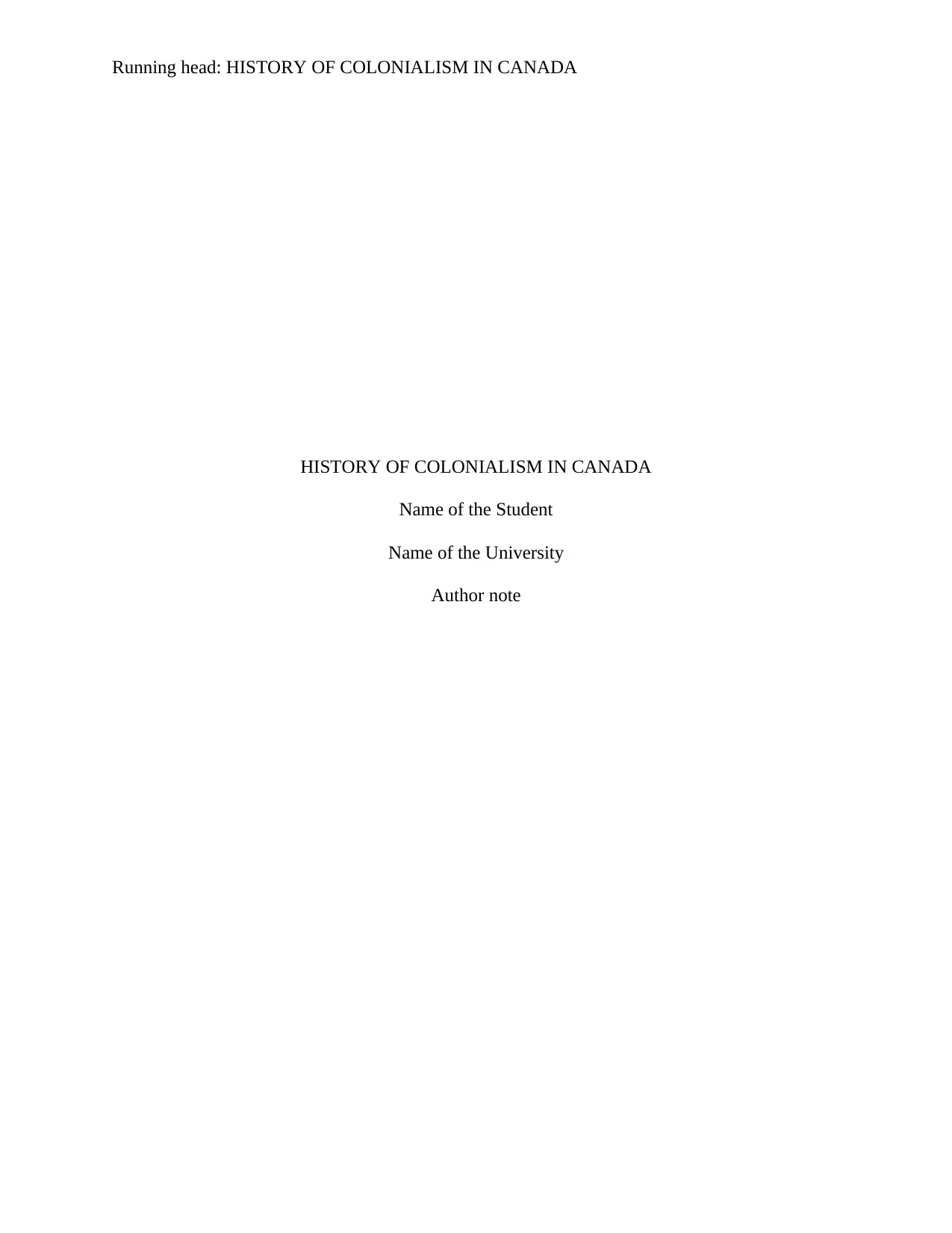
Running head: HISTORY OF COLONIALISM IN CANADA
HISTORY OF COLONIALISM IN CANADA
Name of the Student
Name of the University
Author note
HISTORY OF COLONIALISM IN CANADA
Name of the Student
Name of the University
Author note
Paraphrase This Document
Need a fresh take? Get an instant paraphrase of this document with our AI Paraphraser
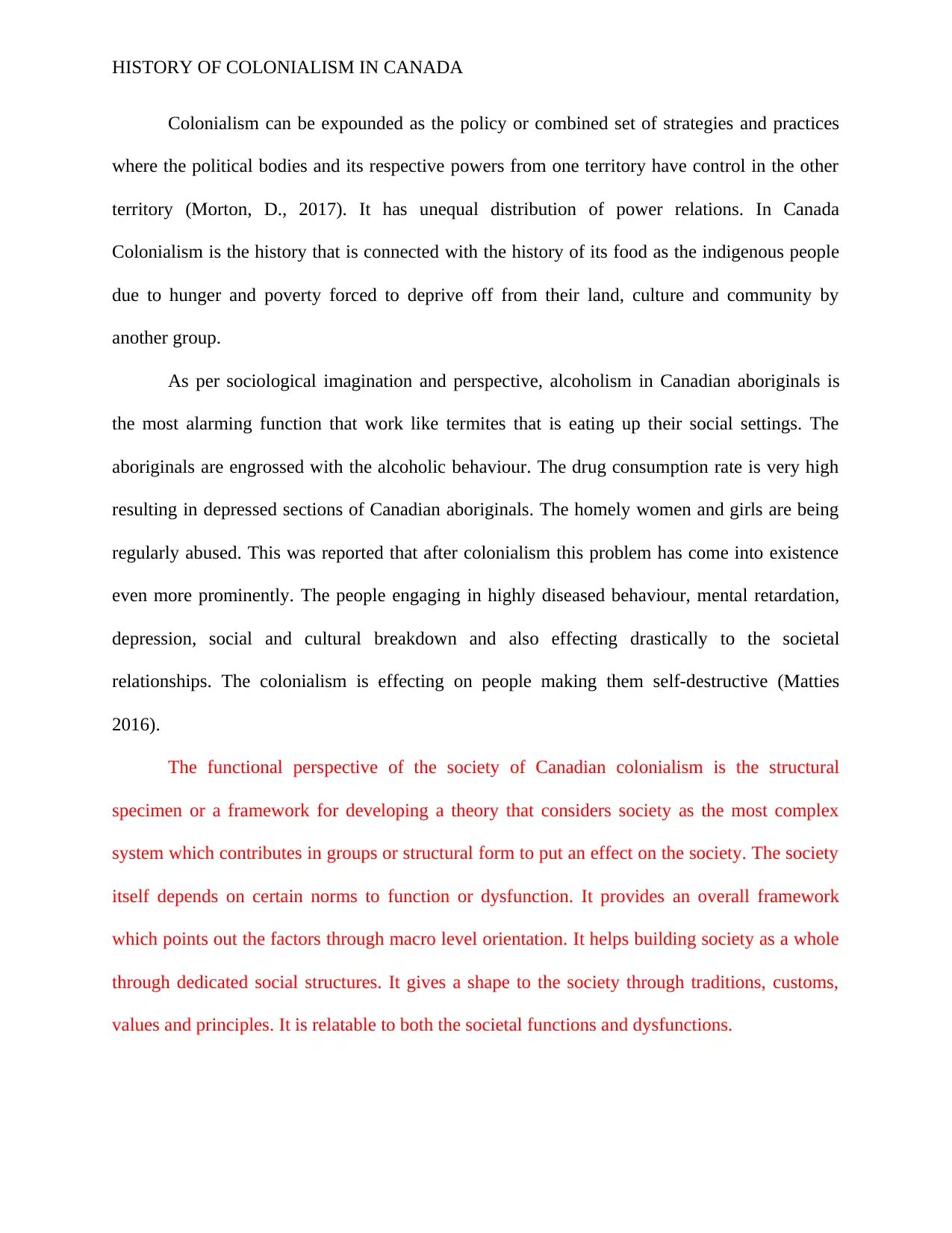
HISTORY OF COLONIALISM IN CANADA
Colonialism can be expounded as the policy or combined set of strategies and practices
where the political bodies and its respective powers from one territory have control in the other
territory (Morton, D., 2017). It has unequal distribution of power relations. In Canada
Colonialism is the history that is connected with the history of its food as the indigenous people
due to hunger and poverty forced to deprive off from their land, culture and community by
another group.
As per sociological imagination and perspective, alcoholism in Canadian aboriginals is
the most alarming function that work like termites that is eating up their social settings. The
aboriginals are engrossed with the alcoholic behaviour. The drug consumption rate is very high
resulting in depressed sections of Canadian aboriginals. The homely women and girls are being
regularly abused. This was reported that after colonialism this problem has come into existence
even more prominently. The people engaging in highly diseased behaviour, mental retardation,
depression, social and cultural breakdown and also effecting drastically to the societal
relationships. The colonialism is effecting on people making them self-destructive (Matties
2016).
The functional perspective of the society of Canadian colonialism is the structural
specimen or a framework for developing a theory that considers society as the most complex
system which contributes in groups or structural form to put an effect on the society. The society
itself depends on certain norms to function or dysfunction. It provides an overall framework
which points out the factors through macro level orientation. It helps building society as a whole
through dedicated social structures. It gives a shape to the society through traditions, customs,
values and principles. It is relatable to both the societal functions and dysfunctions.
Colonialism can be expounded as the policy or combined set of strategies and practices
where the political bodies and its respective powers from one territory have control in the other
territory (Morton, D., 2017). It has unequal distribution of power relations. In Canada
Colonialism is the history that is connected with the history of its food as the indigenous people
due to hunger and poverty forced to deprive off from their land, culture and community by
another group.
As per sociological imagination and perspective, alcoholism in Canadian aboriginals is
the most alarming function that work like termites that is eating up their social settings. The
aboriginals are engrossed with the alcoholic behaviour. The drug consumption rate is very high
resulting in depressed sections of Canadian aboriginals. The homely women and girls are being
regularly abused. This was reported that after colonialism this problem has come into existence
even more prominently. The people engaging in highly diseased behaviour, mental retardation,
depression, social and cultural breakdown and also effecting drastically to the societal
relationships. The colonialism is effecting on people making them self-destructive (Matties
2016).
The functional perspective of the society of Canadian colonialism is the structural
specimen or a framework for developing a theory that considers society as the most complex
system which contributes in groups or structural form to put an effect on the society. The society
itself depends on certain norms to function or dysfunction. It provides an overall framework
which points out the factors through macro level orientation. It helps building society as a whole
through dedicated social structures. It gives a shape to the society through traditions, customs,
values and principles. It is relatable to both the societal functions and dysfunctions.
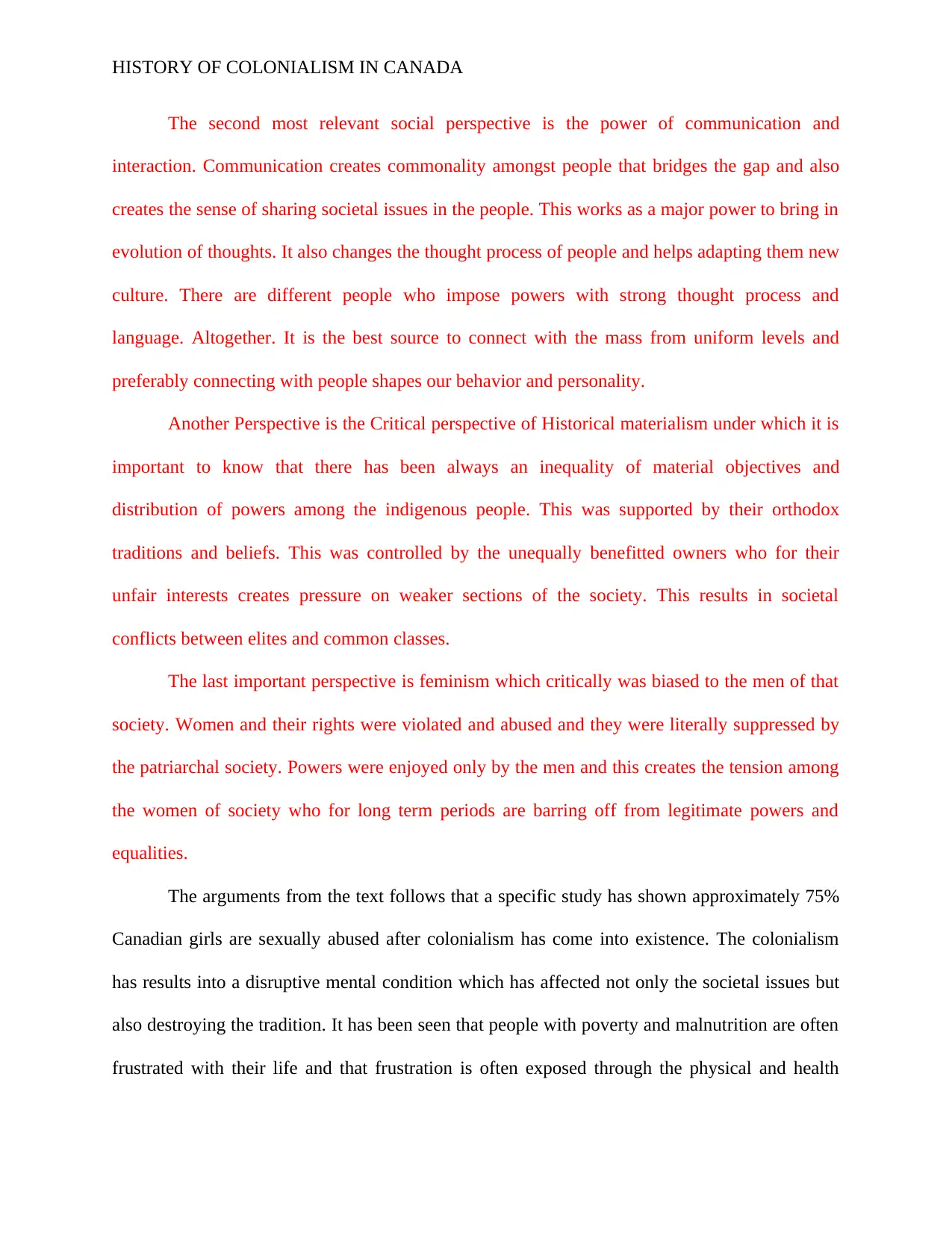
HISTORY OF COLONIALISM IN CANADA
The second most relevant social perspective is the power of communication and
interaction. Communication creates commonality amongst people that bridges the gap and also
creates the sense of sharing societal issues in the people. This works as a major power to bring in
evolution of thoughts. It also changes the thought process of people and helps adapting them new
culture. There are different people who impose powers with strong thought process and
language. Altogether. It is the best source to connect with the mass from uniform levels and
preferably connecting with people shapes our behavior and personality.
Another Perspective is the Critical perspective of Historical materialism under which it is
important to know that there has been always an inequality of material objectives and
distribution of powers among the indigenous people. This was supported by their orthodox
traditions and beliefs. This was controlled by the unequally benefitted owners who for their
unfair interests creates pressure on weaker sections of the society. This results in societal
conflicts between elites and common classes.
The last important perspective is feminism which critically was biased to the men of that
society. Women and their rights were violated and abused and they were literally suppressed by
the patriarchal society. Powers were enjoyed only by the men and this creates the tension among
the women of society who for long term periods are barring off from legitimate powers and
equalities.
The arguments from the text follows that a specific study has shown approximately 75%
Canadian girls are sexually abused after colonialism has come into existence. The colonialism
has results into a disruptive mental condition which has affected not only the societal issues but
also destroying the tradition. It has been seen that people with poverty and malnutrition are often
frustrated with their life and that frustration is often exposed through the physical and health
The second most relevant social perspective is the power of communication and
interaction. Communication creates commonality amongst people that bridges the gap and also
creates the sense of sharing societal issues in the people. This works as a major power to bring in
evolution of thoughts. It also changes the thought process of people and helps adapting them new
culture. There are different people who impose powers with strong thought process and
language. Altogether. It is the best source to connect with the mass from uniform levels and
preferably connecting with people shapes our behavior and personality.
Another Perspective is the Critical perspective of Historical materialism under which it is
important to know that there has been always an inequality of material objectives and
distribution of powers among the indigenous people. This was supported by their orthodox
traditions and beliefs. This was controlled by the unequally benefitted owners who for their
unfair interests creates pressure on weaker sections of the society. This results in societal
conflicts between elites and common classes.
The last important perspective is feminism which critically was biased to the men of that
society. Women and their rights were violated and abused and they were literally suppressed by
the patriarchal society. Powers were enjoyed only by the men and this creates the tension among
the women of society who for long term periods are barring off from legitimate powers and
equalities.
The arguments from the text follows that a specific study has shown approximately 75%
Canadian girls are sexually abused after colonialism has come into existence. The colonialism
has results into a disruptive mental condition which has affected not only the societal issues but
also destroying the tradition. It has been seen that people with poverty and malnutrition are often
frustrated with their life and that frustration is often exposed through the physical and health
⊘ This is a preview!⊘
Do you want full access?
Subscribe today to unlock all pages.

Trusted by 1+ million students worldwide
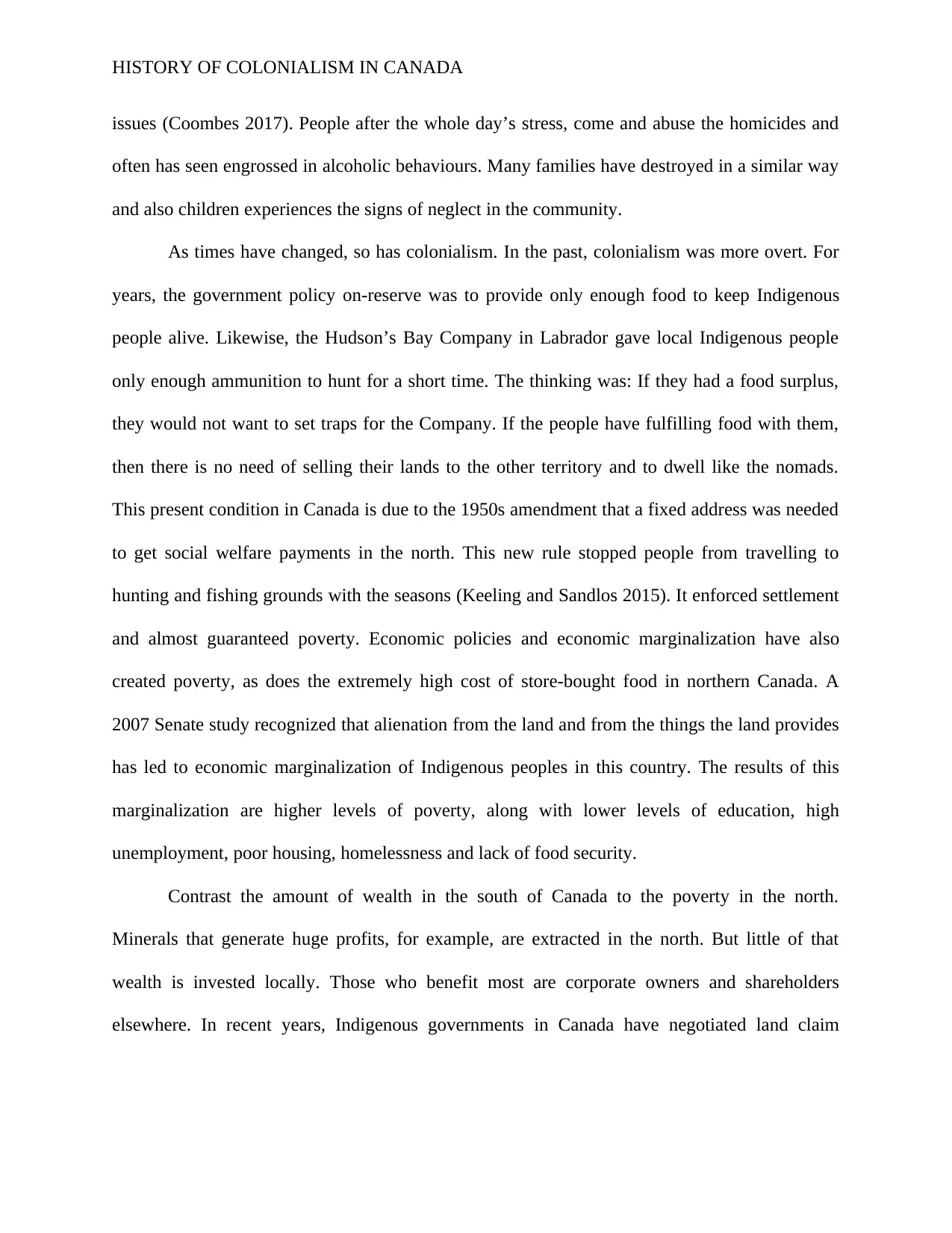
HISTORY OF COLONIALISM IN CANADA
issues (Coombes 2017). People after the whole day’s stress, come and abuse the homicides and
often has seen engrossed in alcoholic behaviours. Many families have destroyed in a similar way
and also children experiences the signs of neglect in the community.
As times have changed, so has colonialism. In the past, colonialism was more overt. For
years, the government policy on-reserve was to provide only enough food to keep Indigenous
people alive. Likewise, the Hudson’s Bay Company in Labrador gave local Indigenous people
only enough ammunition to hunt for a short time. The thinking was: If they had a food surplus,
they would not want to set traps for the Company. If the people have fulfilling food with them,
then there is no need of selling their lands to the other territory and to dwell like the nomads.
This present condition in Canada is due to the 1950s amendment that a fixed address was needed
to get social welfare payments in the north. This new rule stopped people from travelling to
hunting and fishing grounds with the seasons (Keeling and Sandlos 2015). It enforced settlement
and almost guaranteed poverty. Economic policies and economic marginalization have also
created poverty, as does the extremely high cost of store-bought food in northern Canada. A
2007 Senate study recognized that alienation from the land and from the things the land provides
has led to economic marginalization of Indigenous peoples in this country. The results of this
marginalization are higher levels of poverty, along with lower levels of education, high
unemployment, poor housing, homelessness and lack of food security.
Contrast the amount of wealth in the south of Canada to the poverty in the north.
Minerals that generate huge profits, for example, are extracted in the north. But little of that
wealth is invested locally. Those who benefit most are corporate owners and shareholders
elsewhere. In recent years, Indigenous governments in Canada have negotiated land claim
issues (Coombes 2017). People after the whole day’s stress, come and abuse the homicides and
often has seen engrossed in alcoholic behaviours. Many families have destroyed in a similar way
and also children experiences the signs of neglect in the community.
As times have changed, so has colonialism. In the past, colonialism was more overt. For
years, the government policy on-reserve was to provide only enough food to keep Indigenous
people alive. Likewise, the Hudson’s Bay Company in Labrador gave local Indigenous people
only enough ammunition to hunt for a short time. The thinking was: If they had a food surplus,
they would not want to set traps for the Company. If the people have fulfilling food with them,
then there is no need of selling their lands to the other territory and to dwell like the nomads.
This present condition in Canada is due to the 1950s amendment that a fixed address was needed
to get social welfare payments in the north. This new rule stopped people from travelling to
hunting and fishing grounds with the seasons (Keeling and Sandlos 2015). It enforced settlement
and almost guaranteed poverty. Economic policies and economic marginalization have also
created poverty, as does the extremely high cost of store-bought food in northern Canada. A
2007 Senate study recognized that alienation from the land and from the things the land provides
has led to economic marginalization of Indigenous peoples in this country. The results of this
marginalization are higher levels of poverty, along with lower levels of education, high
unemployment, poor housing, homelessness and lack of food security.
Contrast the amount of wealth in the south of Canada to the poverty in the north.
Minerals that generate huge profits, for example, are extracted in the north. But little of that
wealth is invested locally. Those who benefit most are corporate owners and shareholders
elsewhere. In recent years, Indigenous governments in Canada have negotiated land claim
Paraphrase This Document
Need a fresh take? Get an instant paraphrase of this document with our AI Paraphraser
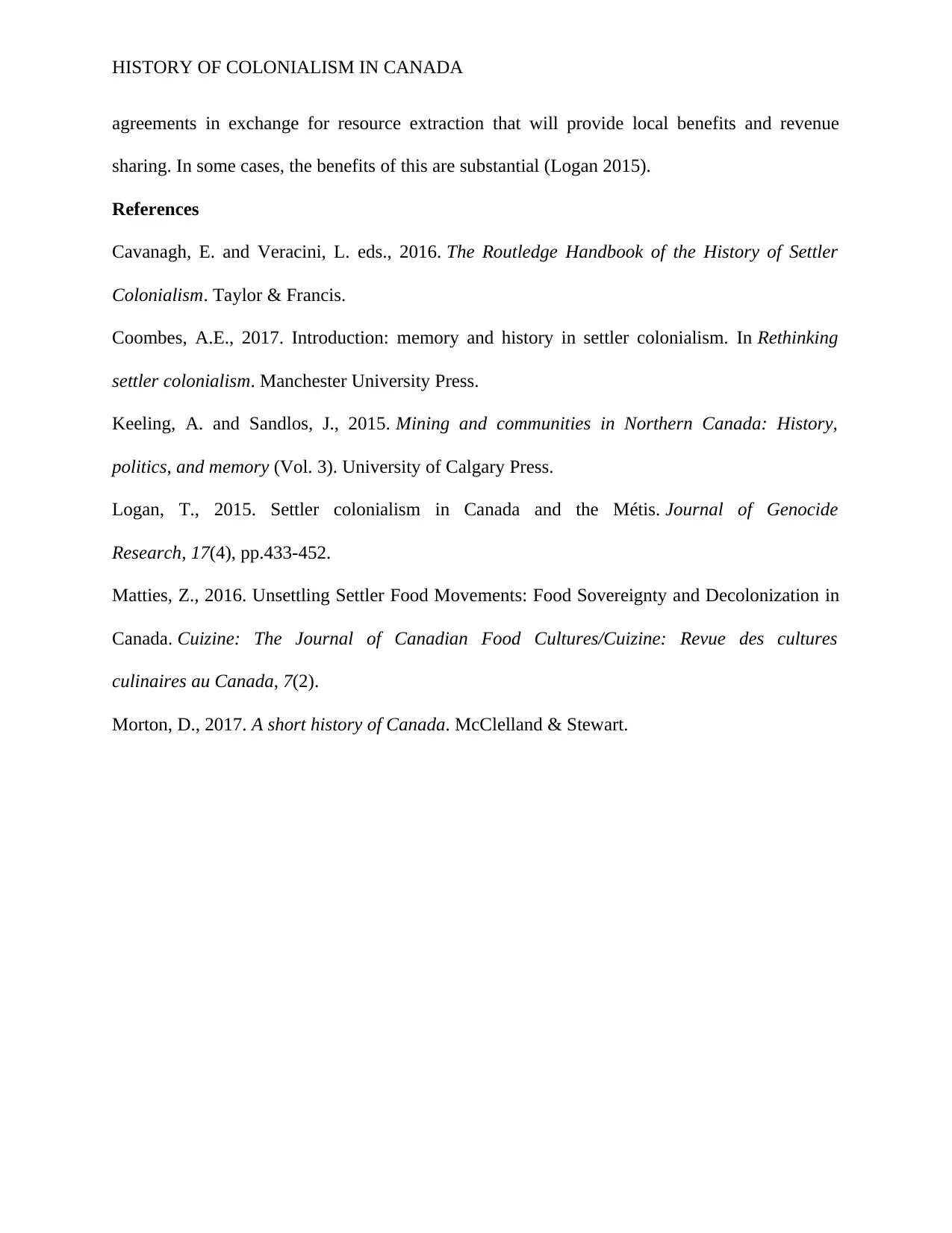
HISTORY OF COLONIALISM IN CANADA
agreements in exchange for resource extraction that will provide local benefits and revenue
sharing. In some cases, the benefits of this are substantial (Logan 2015).
References
Cavanagh, E. and Veracini, L. eds., 2016. The Routledge Handbook of the History of Settler
Colonialism. Taylor & Francis.
Coombes, A.E., 2017. Introduction: memory and history in settler colonialism. In Rethinking
settler colonialism. Manchester University Press.
Keeling, A. and Sandlos, J., 2015. Mining and communities in Northern Canada: History,
politics, and memory (Vol. 3). University of Calgary Press.
Logan, T., 2015. Settler colonialism in Canada and the Métis. Journal of Genocide
Research, 17(4), pp.433-452.
Matties, Z., 2016. Unsettling Settler Food Movements: Food Sovereignty and Decolonization in
Canada. Cuizine: The Journal of Canadian Food Cultures/Cuizine: Revue des cultures
culinaires au Canada, 7(2).
Morton, D., 2017. A short history of Canada. McClelland & Stewart.
agreements in exchange for resource extraction that will provide local benefits and revenue
sharing. In some cases, the benefits of this are substantial (Logan 2015).
References
Cavanagh, E. and Veracini, L. eds., 2016. The Routledge Handbook of the History of Settler
Colonialism. Taylor & Francis.
Coombes, A.E., 2017. Introduction: memory and history in settler colonialism. In Rethinking
settler colonialism. Manchester University Press.
Keeling, A. and Sandlos, J., 2015. Mining and communities in Northern Canada: History,
politics, and memory (Vol. 3). University of Calgary Press.
Logan, T., 2015. Settler colonialism in Canada and the Métis. Journal of Genocide
Research, 17(4), pp.433-452.
Matties, Z., 2016. Unsettling Settler Food Movements: Food Sovereignty and Decolonization in
Canada. Cuizine: The Journal of Canadian Food Cultures/Cuizine: Revue des cultures
culinaires au Canada, 7(2).
Morton, D., 2017. A short history of Canada. McClelland & Stewart.
1 out of 5
Related Documents
Your All-in-One AI-Powered Toolkit for Academic Success.
+13062052269
info@desklib.com
Available 24*7 on WhatsApp / Email
![[object Object]](/_next/static/media/star-bottom.7253800d.svg)
Unlock your academic potential
Copyright © 2020–2026 A2Z Services. All Rights Reserved. Developed and managed by ZUCOL.





